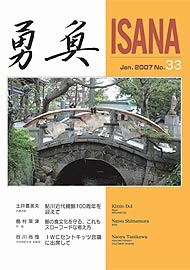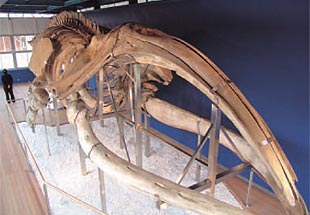ISANA Jan. 2007 No.33
index

ISANA Jan. 2007 No.33
Adoration of Anglo-Saxon Culture and the Whaling Issue

Former Japanese Ambassador to Yemen
It happened during an annual meeting of the International Whaling Commission (IWC) about 20 years ago. A lady of the Swedish delegation, who happened to be sitting in front of us, turned back and threw a keen look of reproach at me as if she was saying "What nerve does this Japanese have to speak so bluntly? Does he deserve to be called a diplomat, this barbarian eating whales?" I was not daunted at all by this challenge. Rather, her blaming look incited me to think that we have to crash this kind of unreasonable assertion of anti-whaling people. However, the fight itself was not our goal. The task before the Japanese delegation was to resist hard against the pressures from anti-whaling forces and make Japan's whaling survive.
Upon coming back to Japan after my lengthy duty in scorching Saudi Arabia, I was told to serve as Director of the Fishery Division of the Foreign Ministry. I resisted, saying "Why should fishes come out from the desert?" But I had to give in because it was the Ministry's order. Probably not only myself but other people as well had thought how a person like me--an outsider to the studies of whales or without knowledge of the whaling industry--could carry out this assignment. Experts at the Fisheries Agency, researchers at the Institute of Cetacean Research and people in the whaling industry must have thought the same way. Yet I had to be up on the stage--with a heavy heart.
Top runners in the anti-whaling bloc were the United States, Britain and Australia--in other words, Anglo-Saxon countries. Not only non-governmental organizations, such as Greenpeace, but also the governments of those countries used every possible tactics to impose pressure on the whaling nations. In the end, they managed to have countries that had nothing to do with whaling join the IWC in an apparent bid to push their assertion through by the strength of numbers. Some delegations had their expenses for travel and accommodations paid by anti-whaling groups and showed up only at the time of voting to raise their hands to say "No" to whaling. I then wondered if this was the ideal of "liberty and democracy" which Western nations have advocated so ardently. This kind of process can be observed in many other instances in the present international scene. This means that the majority groups having superiority in numbers try to make things go as they wish. That is to say, the imposition of values is infesting the world.
It is surprising that this self-centered way of thinking is exercised with impunity, that anything would be possible with power even when a sufficient number is not mustered. A sense of resignation seems to be spreading in the world that such a development cannot be stopped because it is the reality of international society or there is no gain in resisting the powerful. I am one who harbors a grave concern over such an atmosphere.
In recent years, there is a tendency in Japan to literally adore the cultures of Anglo-Saxon countries in many ways, such as the United States and Britain. This is understood to be an extension of Japan's policy "to separate itself from Asia and join the Western nations" and following in the footsteps of Western countries in every area--a policy that the Japanese government promoted during the Meiji Period (1868-1912). Some Japanese obviously think that we need not eat whales in this age of affluence or that we should not resist the U.S. that presses Japan to abandon whaling by saying "no fishery if continue whaling. " It is a sad fact indeed that there are people in Japan who deny their own food culture. What worries me is that the tendency of going along almost blindly with Western nations at the sacrifice of Japan's national pride and following every path after America and Britain for the sake of looking-good and profit does not seem to cease even today.
In the essays I wrote more than 20 years ago, when I was in the Foreign Ministry's Fishery Division, I find such subtitles: "Are whales not saddened by complacent debate by humans?," "Abnormality (in and out of the IWC)," "Can denial of lives and cultures of other people be condoned?," and "Diligent scientific arguments are made, but decisions are taken far apart from such arguments." In an article I contributed to the Economics and Diplomacy Journal in December 1984, under the title "Before the impending whaling moratorium," I pointed out the irrationality of the IWC's decision and asked myself why this had happened?: (1) Who promoted the whaling moratorium?, (2) For what? and (3) "With what perception?" My answer to question (1) was "the United States;Eto (2) was the belief that "killing whales having a higher intelligence is unethical and should not be recognized;Eand to (3) was "an awareness among Western countries that other traditions or cultures that are not theirs cannot be legitimate--in another word, "arrogance..."
It was only three years that I was related to the whaling issue. For the rest of my 40 yearsEcareer at the Foreign Ministry, I had been principally involved in Middle Eastern affairs. But I now feel deeply that those three years might have had a significant influence on my judgment of the international situation thereafter in coping with various issues shaking the Middle East.
In my diary when I was in charge of fisheries in the Foreign Ministry, I wrote down the following short Japanese poem--I don't remember where I came across it.
Whalers have more serene eyes
than those who cry "No killing of whales!"
As I am not quite certain who wrote this poem, I humbly ask here for his or her permission to quote it here.
To close this essay, I would like to take this opportunity to express my sincere thanks and gratitude to those who were kind enough to help me during my mission those past days.

The expectation that dolphins and whales must have high-level intelligence seems to be based on an illusionary conclusion derived solely on the fact that they have relatively large brains and have adapted themselves to the special environment of the ocean.
Contemporary neurology has not progressed sufficiently so as to conjecture the functions of the brain from the form of the brain among animals which seem to be identical or similar. Although state-of-the-art technology is applied extensively, the studies on mental activities of man are still far from conclusive.
Diverse speculations regarding intelligence and mental activities by animals, it seems to me, are in many cases our own assumptions based upon whether we feel it is humanlike or not, when we observe the behaviors and reactions of animals.
All the animals including mankind must obtain energy to maintain their life and must procreate their posterity by the consumption of organisms, i.e. other living things. It is a right given to all animals equally, and is the fate of those subjected to predation. It is no exaggeration to say that animals have evolved through what they consume, and eating habits over a long span of time have allowed man to develop his dietary culture.
In each geological phase before the birth of mankind, nature repeated the cycles of destruction and reproduction. However, as a result of the explosive growth of mankind, as the latest comer, the balance of the ecosystem has been destabilized, with environmental contamination, at a rapid pace and to a grave extent, both directly and indirectly. The impact that has been, or will be, caused by man on the life on the earth can be likened to a cancer, which threatens the survival of mankind. Man should not allow himself to become a cancer cell because the death of the body also means the death of the cancer cell itself.
Ensuring the ecosystem (including the food chain) to remain in a sound condition and survive continuously is an important responsibility of mankind. It is, so to speak, to guarantee the future of mankind. Like other animals, man is also incorporated in nature. Its energy source, whether it is from the benefits from the wildlife or those from harvested or cultured resources, is in the end a benefit from nature that can be reduced to the limited amount of solar energy provided to the earth. Wildlife and cultured/harvested resources should be considered as one whole set of resources.
Living resources are renewable by means of reproduction. The focal point here is how to use the resources within an allowable scope without causing their decline.
Harvesting of whales should be allowed only when the whale resources can be managed sustainably at a certain level and compliance with regulations and a supervision system is ensured in the actual whaling activities. This is the view of the author, who approves the use of wildlife including whales as resources on an appropriate level.
To preserve whale dietary culture is another form of the slow food movement

Writer
Mr. Renpei Komatsu is a journalist for whom I embrace a warm respect. Mr. Komatsu had formerly been a talented reporter on social affairs for the Asahi Newspaper. At one time, he had been a TV caster who enjoyed wide-ranging popularity among viewers.
In my personal affairs, he was a match-maker between my wife and me. When I started dating her, my wife was a great fan of Mr. Komatsu. When I happened to learn about her apdmiration for Mr. Komatsu, I boasted to her, in an attempt to please her, that I am his close acquaintance and would arrange a meeting with him for us.
Enraptured with my promise, she kept on asking when we could meet him. Each time I gave her a noncommittal answer of "I will do it shortly," but frankly I felt somewhat embarrassed about my boast. Although I knew Mr. Komatsu through my job in the mass media society, my acquaintance with him was far from intimate, and I had no assurance asking him to give us time to dine with us. But one day I summoned up my courage and asked him to give us that chance. To my surprise, he accepted my request willingly. That occasion pushed me a step forward toward engagement with her, and Mr. Komatsu attended our wedding ceremony.
So much for the beginning of my relationship with Mr. Komatsu. He is the author of a prominent book entitled "Reportage: the Sea of Whales," published by the Asahi Newspaper in 1973. This book resulted from his experience of being onboard the "last Antarctic whaling fleet" for 117 days in the autumn of 1972 when a 10-year moratorium on commercial whaling was adopted by a majority vote at the U.N. Conference on Human Environment in Stockholm in June. Then deputy director in charge of social affairs at the Asahi, Mr. Komatsu tried to respond, from the perspective of the whaling crew, to the question whether Japan was really engaged in so infamous whaling activities deserving international criticism.
Also, 22 years earlier, when he was in the Agricultural Department of Tokyo University, Mr. Komatsu had the experience of joining the 5th Antarctic whaling expedition.
In the book, he tells that he listened carefully to talks on whales and observed the brave work of whalers onboard whaling ships, and tasted, with much cherish, fresh delicious whale portions, such as "myakutsubo" (backside of the pectoral fin), "nodo-tsuru" (the uvula), and "osane" (baleen root), saying this was the privilege of those who ventured as far as the Antarctic. When the fleet returned to Kobe, he felt as if he had truly become a man of the sea.
He rebutted the vociferous criticism of opponents of whaling as follows: "Over the past few years, the U.S.-led group of countries, including Britain, Mexico, and Argentina, has been urging the International Whaling Commission (IWC) for a 10-year ban of whaling on the pretext of preserving the resources and the environment. They argued the Japanese would not suffer hunger even if they don't eat whales--the Japanese can go perfectly well without whales."
"I cannot help thinking that their argument entails insensible judgment because those countries have vast lands suited for cattle raising and the people are brought up in a food culture of eating bacon in the morning and steak in the evening. Up until only 10 years ago they are the countries that had discarded whale meat as garbage into the sea. And other countries are now supporting their argument. The former whaling countries lost no time in abandoning whaling when they knew that the whale oil market slumped and that an expedition to the Antarctic was no longer profitable. This is an argument of countries that engaged in the formidable abuse of the resources in the Antarctic whaling until recently, while having no knowledge of the presence of the Japanese-type whaling that fully utilized the resources."
"Mr. Komatsu also wrote: "Do those people know the fact that the Japanese racked their brains on how best they could process whales, enhance the product quality, and bring them to consumers by devising various ways of cooking whales?E
Reading the book again, I find this reportage has not at all lost its luster even today. The question the reporter Komatsu felt at that time still persists to this day.
As I was born in November 1945, I spent my boyhood in the prime time of whale meat supply in our diet. Children in my generation were taught at school that the whale was a valuable protein source for the Japanese, and it is a remarkable mammal that can be used in its entirety from oil to baleen.
It has been a long time since we see our one-time favorites such as whale cutlet and bacon on our table. Whale tailmeat, which we can have only at specialized whale restaurants, fetches a much higher price than the best parts of tuna--meaning that it has become a food beyond the reach of ordinary people.
Ironically, it is now said that the prohibition of whaling for a lengthy duration has been causing an increase in the whale population, and whales are now consuming large quantities of fish, causing a decline in fish resources and also an imbalance in the marine ecosystem.
Can we save whales without protecting the earth? I am one who wishes to continue my effort in letting the world know the "Japanese wisdom" in which both whales and humans coexist.
WHY DO WE NEED MULTI-CULTURE?- Food Security and World Peace -

Manager
Japan Fisheries Association
The plenary session of this year's annual meeting of the International Whaling Commission (IWC) was held for five days from June 16 in St. Christopher and Nevis, a tiny island country in the Caribbean (commonly called St. Kitts and Nevis in the region). For me, this was the third time to attend the IWC annual meeting after those held in Shimonoseki, Japan and Ulsan, Korea.
My area of specialty being geography (human geography and economic geography), I took an immense interest in going to the Caribbean region first of all. I found out that I could reach the country in one day by flying from Tokyo via Chicago and San Juan in Puerto Rico. My return trip, however, required one night's stay in Chicago, after flying from St. Kitts to Miami.
As an NGO with scarce financial resources, I faced difficult problems in procuring funds for travel and accommodations. Especially we racked our brain on how to find a cheaper hotel. Unlike the last meeting in Ulsan, we have fewer NGOs supporting our cause. In our travel, I truly felt that the Caribbean is a far-away region.
However, I had the merit of coming to the Caribbean with much effort because I could witness the historical moment of the adoption of the St. Kitts and Nevis Declaration on the third day of the meeting.
Japan's proposal on the second day regarding permission to catch 150 minke whales in Japan's coastal waters was rejected with the votes of 30 in favor, 31 against and 4 abstentions. Five of the 70 members were either absent or deprived of the voting right. In this voting, we caught up with the anti-whaling bloc to the extent of a difference of only one vote.
On the next day, the epoch-making St. Kitts and Nevis Declaration was adopted with 33 votes in favor, 32 against and one abstention (China). Senegal, which had been absent until the previous day, arrived and cast a supporting vote. Also, the supporting votes of the Republic of Korea and Denmark--two countries not necessarily fully supporting Japan--contributed greatly.
A big applause arose in the conference room at the moment when a declaration stating that the commercial whaling moratorium is no longer necessary was adopted. It was a moment when the pro-sustainable whaling group, which sustained defeats since 1982, marked a victory at long last.
After the Chair's statement on the adoption of the declaration, objections were put forward by anti-whaling countries. The first hysteric voice was raised by Brazil, which said that it does not recognize the validity of this voting. The reason given was that Iceland's participation in the voting was illegal. As is known, Iceland withdrew from the Commission membership several years ago. Later, when Iceland asked for readmission to the IWC, its request had not been accepted smoothly by the malevolent resistance of anti-whaling countries. The issue was unsettled at the Shimonoseki meeting four years ago because the anti-whaling group took issue with Iceland's past records. It seems to me that the anti-whaling countries tended to object to anything they chose as unacceptable.
Humorously enough, however, Iceland had been taking part in the voting until the previous day. It cast a vote in favor of Japan's proposal regarding coastal whaling. To that voting, Brazil did not object. Anti-whaling members never complain when their assertion is accepted. Conversely, when they are denied, they bring up every reason to the contrary. To Brazil, views were expressed from the floor, such as "Be courageous enough to admit your defeat" or "This is democracy", each time with laughter and applause.
The countries supporting whaling nations such as Japan and Norway are mainly those from the Caribbean (including St. Kitts and Nevis that hosted the present meeting), Africa, Asia (Mongolia and Cambodia) and the South Pacific, including Palau, Kiribati and the Solomon Islands. People in those countries have no special intention to eat whales.
Why, then, do they support Japan? Their position is related to the assertion of the anti-whaling animal welfare groups and conservationists to totally protect not only whales but all marine species (fish) including tunas. What they are saying is tantamount to saying that humans should not use marine wildlife resources as food.
Many of the countries supporting Japan are developing countries. They are seeking their own food in the sea and are trying to earn foreign currency through exports of marine products. They find themselves in a position where they should firmly oppose the moves to hamper the sustainable development of their resources.
With the whale as a symbol, the IWC has now become a forum of confrontation between the groups supporting sustainable use of marine living resources and those who adamantly oppose such use. This is the North-South problem as embodied in the Commission, with the industrialized countries in the north taking the environmentalist position while the developing nations in the south being the proponents of sustainable utilization.
Further, Greenpeace and other anti-whaling organizations are accusing that the votes of the developing countries' group supporting Japan have been bought out under Japan's official development assistance (ODA). These accusations are truly hurting the pride of these nations. Japan is extending its ODA on an equal basis to developing countries taking the anti-whaling position as well. The charge directed at those countries is off the point. The animosity against conservation groups which insult them exceeds the intensity of Japan’s feeling against those organizations.
A resolution against the dangerous actions of Greenpeace vessels toward Japan's research vessels in the Antarctic was adopted by consensus. It meant that anti-whaling countries, on their part, could not take actions to support environmental terrorism.
Scientific and rational consultations based on common sense should be the starting point of democracy. Japan’s proposal to host a meeting on normalizing the Commission which lacks such a basic posture was undoubtedly one of the most important moves at this meeting.

